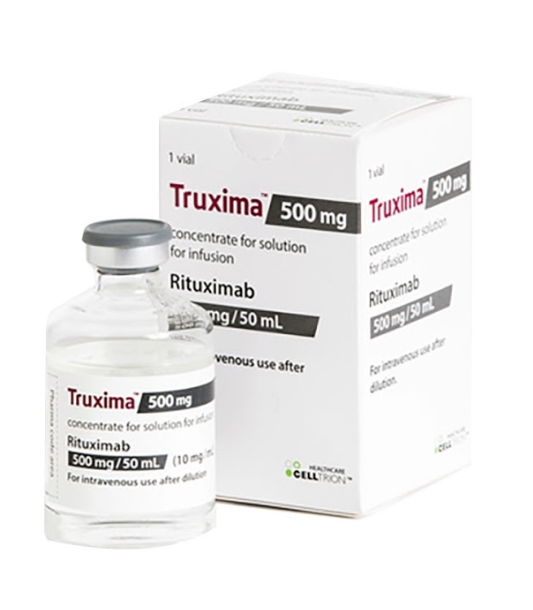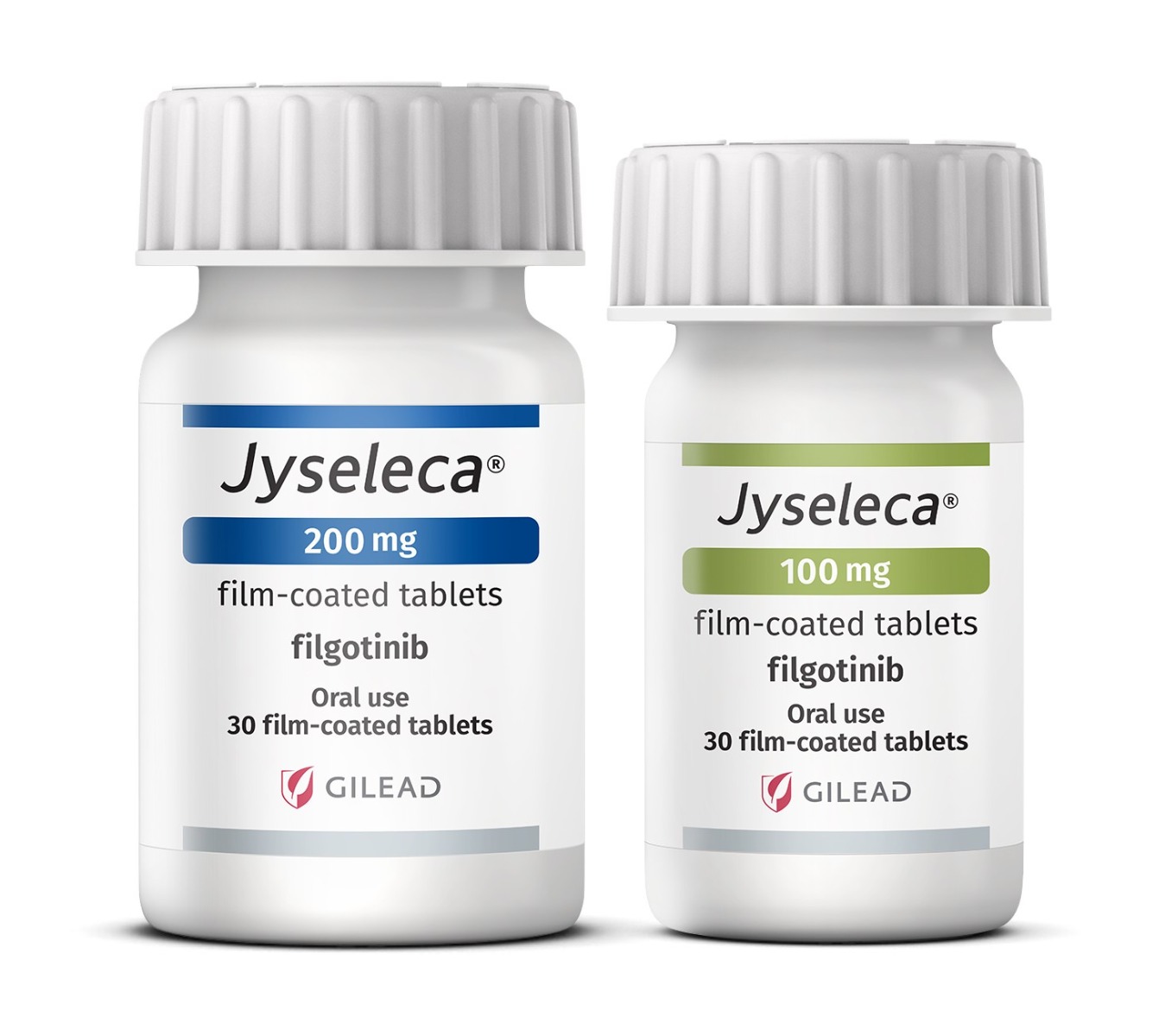Truxima (rituximab) vs Jyseleca (filgotinib)
Truxima (rituximab) vs Jyseleca (filgotinib)
Truxima (rituximab) is a monoclonal antibody that targets CD20-positive B cells and is used for treating conditions such as non-Hodgkin's lymphoma, chronic lymphocytic leukemia, rheumatoid arthritis, and certain autoimmune diseases. Jyseleca (filgotinib) is a selective JAK1 inhibitor that is used for treating moderate to severe rheumatoid arthritis by modulating the immune response. When deciding between Truxima and Jyseleca, it is important to consider the specific condition being treated, as Truxima is used for a broader range of diseases including cancers, while Jyseleca is specifically indicated for rheumatoid arthritis and the choice will also depend on the patient's medical history, potential side effects, and the treating physician's recommendation.
Difference between Truxima and Jyseleca
| Metric | Truxima (rituximab) | Jyseleca (filgotinib) |
|---|---|---|
| Generic name | rituximab | filgotinib |
| Indications | Non-Hodgkin's lymphoma, chronic lymphocytic leukemia, rheumatoid arthritis, granulomatosis with polyangiitis, and microscopic polyangiitis | Rheumatoid arthritis, psoriatic arthritis, and ulcerative colitis |
| Mechanism of action | CD20-directed cytolytic antibody | Janus kinase (JAK) inhibitor |
| Brand names | Truxima, Rituxan, MabThera | Jyseleca |
| Administrative route | Intravenous infusion | Oral |
| Side effects | Infusion reactions, infections, body aches, fatigue, skin rashes | Nausea, respiratory infections, elevated liver enzymes, thrombosis, anemia |
| Contraindications | Severe infections, hepatitis B reactivation, severe cardiac disease | Severe liver disease, active serious infections, thrombosis risk |
| Drug class | Monoclonal antibody | Janus kinase inhibitor |
| Manufacturer | Celltrion Healthcare, Teva Pharmaceuticals, Genentech (Roche) | Gilead Sciences |
Efficacy
Truxima (rituximab) for Rheumatoid Arthritis
Truxima, a biosimilar to the original rituximab brand Rituxan, is a monoclonal antibody that targets the CD20 antigen on the surface of B-cells. It is used in the treatment of rheumatoid arthritis (RA) in patients who have had an inadequate response to one or more tumor necrosis factor (TNF) antagonist therapies. The efficacy of rituximab in RA has been demonstrated in several clinical trials, where it has been shown to reduce symptoms and slow the progression of joint damage. Patients receiving rituximab in combination with methotrexate have experienced improvements in disease activity scores and physical function.
Jyseleca (filgotinib) for Rheumatoid Arthritis
Jyseleca is a selective Janus kinase (JAK) inhibitor, specifically targeting JAK1. It is approved for the treatment of adults with moderate to severe rheumatoid arthritis who have responded inadequately to, or who are intolerant to one or more disease-modifying antirheumatic drugs (DMARDs). Clinical trials have shown that filgotinib significantly reduces the signs and symptoms of RA, including tender and swollen joints, compared to placebo. It has also been found to improve physical function and to inhibit the progression of structural joint damage.
Comparative Efficacy in Rheumatoid Arthritis
When comparing Truxima and Jyseleca, both medications have been found to be effective for the treatment of RA in specific patient populations. Truxima is often considered for patients with an inadequate response to TNF inhibitors, while Jyseleca can be used in those who have had an insufficient response to DMARDs. The choice between these medications may depend on individual patient factors, previous treatments, and the presence of comorbidities. Both treatments are part of a broader RA management strategy that includes other pharmacologic interventions and lifestyle modifications.
Conclusion
In conclusion, both Truxima (rituximab) and Jyseleca (filgotinib) have proven efficacy in the treatment of rheumatoid arthritis, offering valuable options for patients who have not adequately responded to other therapies. Their use is supported by clinical trial data demonstrating significant improvements in disease activity and quality of life for patients with RA. As with any medication, the decision to use Truxima or Jyseleca should be made by a healthcare professional, taking into account the full clinical picture of the patient.
Regulatory Agency Approvals
Truxima
-
European Medical Agency (EMA), European Union

-
Food and Drug Administration (FDA), USA

-
Health Canada

-
Therapeutic Goods Administration (TGA), Australia

-
Medsafe (NZ)

Jyseleca
-
European Medical Agency (EMA), European Union

-
Pharmaceuticals and Medical Devices Agency (PMDA), Japan

Access Truxima or Jyseleca today
If Truxima or Jyseleca are not approved or available in your country (e.g. due to supply issues), you can access them via Everyone.org.
How it works

Make an enquiry
Choose the medicine you want to buy, answer a couple of questions, and upload your prescription to speed things up. We’ll get back to you within 24 hours.


Make an enquiry
Choose the medicine you want to buy, answer a couple of questions, and upload your prescription to speed things up. We’ll get back to you within 24 hours.


Breeze through the paperwork
We'll guide you through the required documents for importing unapproved medicine, ensuring you have all the necessary information.


Get a personalized quote
We’ll prepare a quote for you, including medicine costs and any shipping, administrative, or import fees that may apply.


Receive your medicine
Accept the quote and we’ll handle the rest - sourcing and safely delivering your medicine.

Some text on this page has been automatically generated. Speak to your physician before you start a new treatment or medication.
Let's talk
If you have any questions, call us or send us a message through WhatsApp or email:
Contact us




